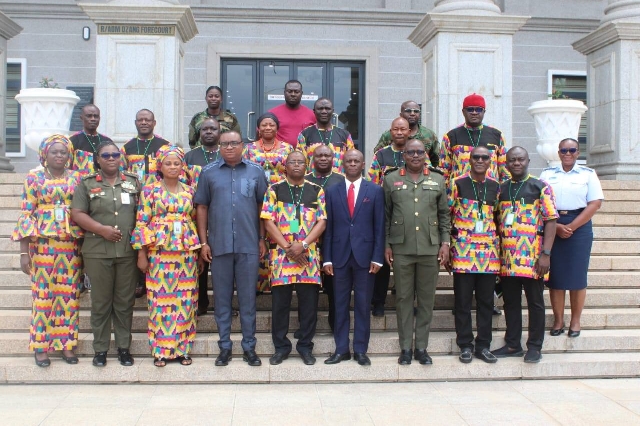Nigerian security delegation visits Ghana to study non-state security threats
 The Nigerian security delegation with Deputy Defence in Accra
The Nigerian security delegation with Deputy Defence in Accra
A 20-member delegation from Nigeria’s National Institute of Security Studies (NISS), currently undertaking the Executive Intelligence Management Course 18, has paid a working visit to The Square in Accra as part of a strategic study tour to Ghana.
The visit forms part of their ongoing research under the theme: “Non-State Actors in Security Management: Issues, Challenges, and Prospects for Peace and Development in Africa.”
The aim is to better understand the complex security threats confronting Ghana and how the country is addressing these challenges through coordinated national and regional efforts.
Head of the delegation, Mr. Rafiu Bolarinwa Adekunle, Director of Research and Library Studies at the NISS, explained that the study tour is designed to help participants explore practical strategies and best practices to tackle Nigeria’s own evolving security threats.
He noted that findings from the tour will be compiled into actionable recommendations for the Nigerian government.
The delegation was warmly received by Deputy Minister for Defence, Mr Ernest Brogya Genfi, who stood in for the sector Minister.
Also present were the Chief Director and senior management officials from the Ministry of Defence.
Mr. Brogya Genfi acknowledged the longstanding diplomatic and defence relations between Ghana and Nigeria and commended the delegation for choosing Ghana as a destination for strategic learning.
“The Ministry of Defence provides strategic leadership on national defence and works in concert with other state security institutions to preserve peace and national stability,” the Deputy Minister said.
During the engagement, the Principal General Staff Officer (PGSO), Brigadier General Ben Gah, delivered a presentation on Ghana’s current security landscape.
He noted that while the country’s northern borders remain vulnerable to spillover threats from extremist groups in the Sahel, Ghana has so far not experienced any direct violent extremism.
Brig. Gen. Gah further outlined key non-state threats confronting Ghana, including cyber-attacks, illegal mining (galamsey), maritime insecurity, armed robbery, human trafficking, and herdsmen-related violence.
He highlighted several strategic interventions and collaborative efforts aimed at curbing these threats and maintaining national security.
Source: Classfmonline.com/Cecil Mensah
Trending News

NPP flagbearer hopefuls unite in rare group photo after strategic meeting
15:09
GFL calls for tougher local accountability in galamsey fight
03:37
Over 60 'mighty-minority' MPs at Bawumia’s office to lend their support
14:41
Nigerian security delegation visits Ghana to study non-state security threats
14:55
S/R: Gonjaland Youth Association calls for establishment of security Post at Jakpa Palace
03:25
Ghana Coalition Against Galamsey renew calls for repeal of controversial mining law
14:02
Woman caged for spending GHS 800,000 mistakenly transferred to her account
14:41
GFL calls for reassignment of Special Prosecutor over loyalty concerns
01:16
First Lady praises Merck Foundation for training Ghanaian doctors
11:21
UAE ambassador pledges support for Accra’s modernisation agenda
14:26



